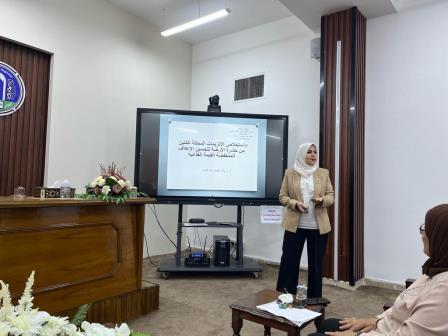A scientific lecture was delivered as part of the events of the Global Entrepreneurship Week organized by the Department of Animal Production at the College of Agricultural Engineering Sciences, University of Baghdad. The lecture was given by Prof.Dr. Wafaa Hameed Abdul Sattar, an expert in animal nutrition, and specifically focused on the termite insect. The event was attended by the Dean of the College of Agricultural Engineering Sciences, Prof.Dr. Amira Mohammed Saleh, and Mr. Hossam Jassim Hussein, the Head of the Animal Production Department, along with several faculty members and staff of the department, as well as postgraduate students.
This study aimed to extract enzymes capable of degrading lignocellulosic materials, especially lignin, with the utilization of termite insects as an effective means to protect trees and wood. This is achieved by using three enzymes with lignin-degrading properties from termite insects, namely Lacaes, Lacaes Peroxides, and Manganese Peroxides. The study found a significantly high superiority in lignin degradation using the enzyme Lacaes at a concentration of 5% and an incubation period of 21 days. This resulted in an improvement in dry matter and organic matter digestibility coefficients, an increase in protein content, and ether extract. This enhances the nutritional value of the feed for experimental animals, which were Awassi sheep subjected to a digestion experiment to estimate the digestibility coefficients of dry matter and organic matter.
Prof.Dr. Wafaa recommended conducting further studies to extract the remaining enzymes and assessing their importance in the animal production sector. Additionally, exploring the possibility of isolating some microorganisms that degrade indigestible fibers from the intestines of termite insects could be considered.
In conclusion, this study represents a significant step towards improving the quality of feed and combating pests in the agricultural sector. The results indicate the potential use of these lignin-degrading enzymes as an effective alternative to imported enzymes, contributing to the enhancement of animal production and improving the nutritional value of feeds.










